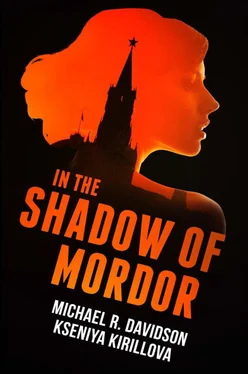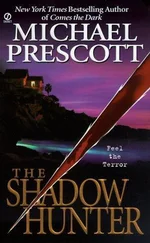He escorted her along the familiar route on Bol’shaya Lubyanka . Olga was surprised when he guided her into Furkosovskiy Pereulok . FSB headquarters is located in the massive Lubyanka building, a huge pile of yellow bricks that housed an insurance company in pre-Soviet times. Behind the familiar massive façade that faces Lubyanka Ploshchad lays an entire complex of interconnected buildings.
The officers of the FSB, formerly the Second Chief Directorate of the KGB, do not envy their former colleagues of the SVR their modern Yasenevo high-rises. Tradition is valued in the Lubyanka.
It was Olga’s dream to enter the doors that faced the square. Noting her curiosity, Gleb explained, “The main doors off the square are used only for ceremonial occasions. This is where the operatives enter.”
He pointed to an imposing set of solid metal gates with a small traffic signal to one side.
Inside the gates was a featureless courtyard with a vehicular entrance to a subterranean garage and several other closed doorways without any indication of where they led. Immediately to the right after entering was a set of double doors, and this was where Solntsev led her, explaining that this was Building 1.2, where the executive offices were located.
Olga was thrilled to the bone. She was following literally in the footsteps of real Chekists. Probably “ Iron” Feliks Dzerzhinsky himself had trod these stones. She did her best to conceal her enthusiasm, but it did not escape Gleb Solntsev’s practiced eye. “ She’ll do,” he thought. He detected no doubts or suspicion in the girl. His instincts had once again proven accurate.
He led her down a corridor to an elevator that took them to the third floor, and then down another long corridor covered by a beige runner. They stopped outside a room that bore the number given to Olga in Yekaterinburg.
Boris Ivanovich, his Stalin/walrus face wreathed in a smile, waited for them in a straight-backed chair at the head of a well-polished conference table that could easily accommodate twenty. Today he was wearing an olive green FSB uniform with the three stars of a full colonel on the epaulets.
He waved them to be seated next to him at the head of the table. Just as they were sitting down, the door opened to admit a tall, spare, older man with a full head of iron gray hair and fierce, nearly black eyes under a thick tangle of eyebrows.
Boris Ivanovich and Solntsev quickly stood, and Olga followed suit. This was clearly a man of importance. The older man pulled out a chair halfway down the table and flicked his wrist for them to be seated. He didn’t say a word, but those black eyes never strayed from her. She was afraid to return the gaze.
Boris Ivanovich cleared his throat. “Olga, this is an important day for you, and one you will not forget. First, my name is not Boris Ivanovich. I am Colonel Aleksandr Kozlov, and officially I do not exist.”
Unsure where this was leading, Olga straightened her spine and kept her eyes on the Colonel, who continued ponderously, “I do not exist on any roster of FSB personnel. I am paid from a special fund that is untraceable. From this moment, your name and records have been expunged from FSB files, as well.”
It occurred to Olga that she had been unaware that she even had an FSB file.
“You are known publicly as a member of ‘ Svoi ,’ and nothing can be done to change that, but we can take certain precautions. You will inform your family and friends that you have resigned from ‘ Svoi ,’ for perfectly honorable reasons, of course. There will be no reason for you to hang your head. On the contrary, you have been offered a lucrative position with a think tank in Washington that specializes in Russian affairs. It is called ‘The Russian-American Study Group.’ You will be paid through them, and you will receive an extra stipend for clothing. Naturally, an apartment will be rented for you.”
Kozlov paused to see how she was receiving his words. Satisfied, he continued, “The avowed purpose of the ‘Russian-American Study Group’ is to promote good relations and understanding between the Russian Federation and the United States. Its true mission is to promote Russian ideas and counteract American propaganda. You will be expected to engage influential Americans, young people, and media in dialogue and convince them to support our cause. This will not always be easy, but Americans are easily corruptible, not very intelligent, and we already have many of them working for us in Washington and throughout the country. We are especially interested in working with Russian émigrés to strengthen their ties to the Motherland. Do you understand?”
Olga gulped and nodded her head. She was not a little daunted by the tasks they were setting for her.
The Colonel smiled benignly, reading her thoughts. “You won’t be alone in this work, Olga Vladimirovna. Besides your colleagues at your cover office, you will have regular contact with one of our people at the Embassy in Washington. He will be your case officer, your guide, and is there to support you in any way required. While your work with the ‘Russian-American Study Group’ is very important, there is another side to your mission that will be handled exclusively between you and your case officer. This is the reason for the training we gave you in Yekaterinburg. Do you think you can handle all that?”
Olga nodded and managed to say, “Yes sir.”
The men in the room regarded her somberly for what seemed an eternity until Kozlov nodded and pushed a button at his side. The door opened, and a man in a white jacket wheeled in a cart loaded with delicacies and a bottle of shampanskoye .
The tall, older man, who had not uttered a word, rose from the table, nodded at the Colonel and Solntsev, and left the room after a final, judgmental glance at Olga.
When the three of them were alone, Kozlov popped the cork on the bottle with practiced finesse and filled three champagne flutes. He raised his glass and said, “With the dissolution of the Soviet Union and the advent of ‘democracy,’” his voice dripped with sarcasm as he pronounced this word, “traitors were suddenly and inexplicably made into heroes, state secrets were revealed to our enemies. And all the while the Americans continued to recruit agents of influence, to dig tunnels under our embassy in Washington, and to expel dozens of our people. I cannot list all the injuries inflicted upon us. But now, thank God and our new leadership, Russian special services are regaining their feet and becoming what they should be — strong, professional, and supported by the narod . The chekist is once more valued and admired, and you are now one of us, Olga.”
He was an older man, a KGB veteran now assigned to the SVR’s Directorate KR, counterintelligence. Given his intimate familiarity with the control exerted over the capital’s streets by surveillance teams and cameras, as well as technology to detect clandestine communications, it was surprising that, among the several in-place assets handled by the CIA, he would insist on personal meetings. This was risky, but he was an extremely valuable source.
The only person Vance Johnson trusted to handle these meetings was himself. The CIA Station Chief was “declared” to the SVR and expected to manage liaison relations. If the SVR knew his identity and role, so did the FSB and its omnipresent surveillance teams. The question was: would his status lull the Russians into believing that a declared officer was unlikely to attempt clandestine activities in Moscow; or, would his status make him a prime surveillance target?
The SVR penetration was uniquely placed to provide invaluable intelligence. In the post-Aldrich Ames era, he was in a position to provide early warning should another CIA officer be recruited, and he enjoyed some access to FSB activities. So, when the source signaled for an unscheduled meeting, Vance Johnson was set in motion.
Читать дальше












